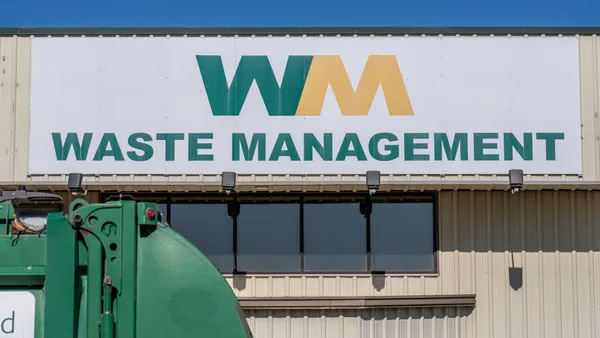UPDATE: March 12, 2020: On Thursday, the Solid Waste Association of North America (SWANA) postponed its imminent SWANApalooza conference, set to be held at the end of the month. The decision was made amid mounting concern in the United States, where cases of COVID-19, the disease caused by the new coronavirus, have surpassed 1,300 and 38 people have died.
Dive Brief:
- Waste and recycling trade groups are monitoring the spread of the new coronavirus amid concerns that workers might be vulnerable to exposure. More than 120,000 people are currently infected worldwide, with more than 4,300 fatalities reported, according to Johns Hopkins University as of publication.
- Both the Solid Waste Management Association of North America (SWANA) and the National Waste and Recycling Association (NWRA) told Waste Dive they are tracking the issue and have released guidance. The Institute of Scrap Recycling Industries (ISRI) has given a webinar on the global impacts of the virus, and spokesperson Mark Carpenter also directed Waste Dive to a member alert laying out best practices.
- Despite uncertainty from the public, SWANA CEO David Biderman indicated the organization believes solid waste workers are not at an elevated risk for contracting COVID-19, the disease associated with the spreading coronavirus. “This was in response from questions from a handful of private and public sector officials who have contacted us," he told Waste Dive, referencing SWANA's decision to release guidance.
Dive Insight:
SWANA's guidance, available on the organization's website, recommends that "at this time, no special precautions to protect waste workers from COVID-19 are recommended when handling municipal solid waste" outside of traditional practices.
Any waste suspected to be contaminated should be treated like regulated medical waste, SWANA also cautioned, with workers instructed to use appropriate engineering and administrative controls as well as personal protective equipment (PPE). Employers, meanwhile, are being advised to separate sick employees and encourage them to stay at home. Routine environmental cleaning in the workplace is also recommended, along with following updates from the Centers for Disease Control and Prevention (CDC). Employees who have sick family members are encouraged to share that information with their supervisors.
The coronavirus is not considered a Category A infectious substance, meaning it is not expected to cause death or permanent disability when encountered by otherwise healthy humans and animals.
NWRA's Healthcare Waste Institute meanwhile prepared interim guidance addressing the virus at the end of January and released another document this week. The organization advised workers to treat waste from homes where individuals with COVID-19 live "as they would for the flu." ISRI similarly advised members to follow CDC health instructions, in addition to modifying them based on the needs of recyclers.
"One question that has arisen is if there an [increased] risk due to processing aluminum cans," the organization wrote in an email to members, going on to suggest typical PPE, along with keeping surfaces clean.
Municipalities and service providers are among those facing concerns. There has been worry in China over the disposal of face masks and medical waste, seemingly due to a dearth of suitable incineration options. But some local officials are echoing the advice given by organizations like SWANA and NWRA, encouraging the usual precautions while maintaining there is no elevated risk at this time.
For example, Washington's King County Solid Waste Division — an area currently dealing with the most cases of COVID-19 — has said it does not believe there is an elevated risk to facility employees or haulers. The county's Cedar Hills Regional Landfill, along with its transfer and drop-off stations, are operating as normal for the time being.
Major industry conferences and events, however, are increasingly in peril. WasteExpo, set to take place in New Orleans in May, has now been postponed to August. The Southeast Recycling Conference meanwhile canceled its imminent Florida conference and next week's first-ever National Zero Waste Conference has also been canceled in California. Still, as of publication ISRI's annual convention in Las Vegas is still on for April and SWANApalooza, scheduled for the end of the month in Atlanta, was also set to go ahead.
While public discussion has been quieter among major companies so far, at least one has acknowledged potential impacts the spread of the virus might have on the industry at large.
During a Feb. 26 investor event, Waste Management CFO Devina Rankin addressed "incremental impacts" for special waste and C&D contracts. Asked about global economic fallout stemming from the outbreak of the virus in China, specifically related to reduced volumes in the industrial sector, she recognized some exposure but caveated it was hard to predict the supply chain risks and ripple effects.
"[That's] the piece that's really a big unknown for us. Not in terms of how we do our business, but in terms of how the rest of the U.S. economy is able to sustain and continue to perform with this backdrop," said Rankin. "I think it's really too early to tell, but I think it's a small enough part of the overall business, there's enough fundamental strength that we think the rest of the business will continue to prevail."










